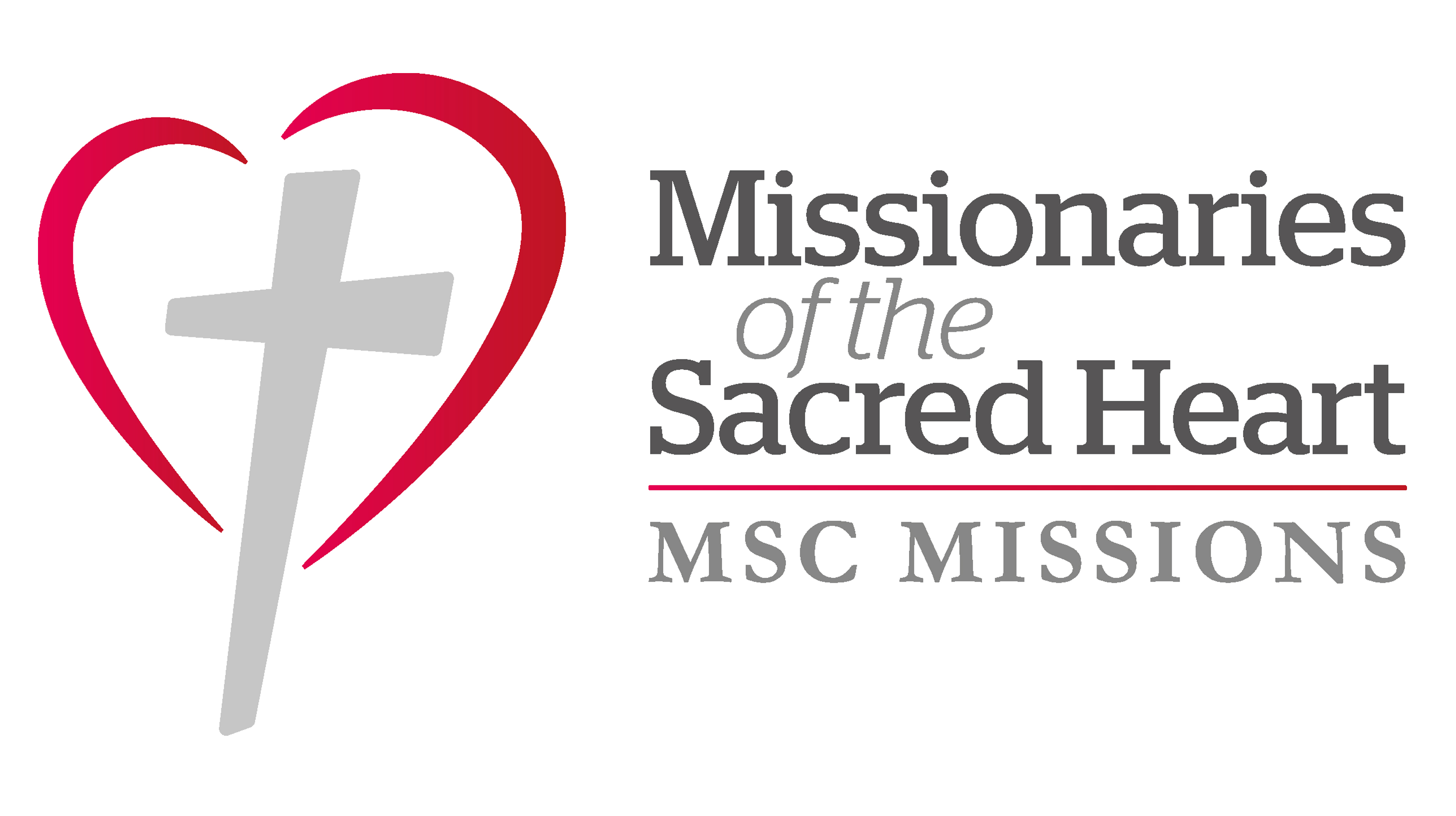Feb 11, 2025
OLSH Global Outreach
MSCs from all over the world continue to work in partnership with the Daughters of Our Lady of the Sacred Heart (OLSH), providing help and support to the poor and vulnerable on our shared mission: “May the Sacred Heart of Jesus be everywhere loved.”
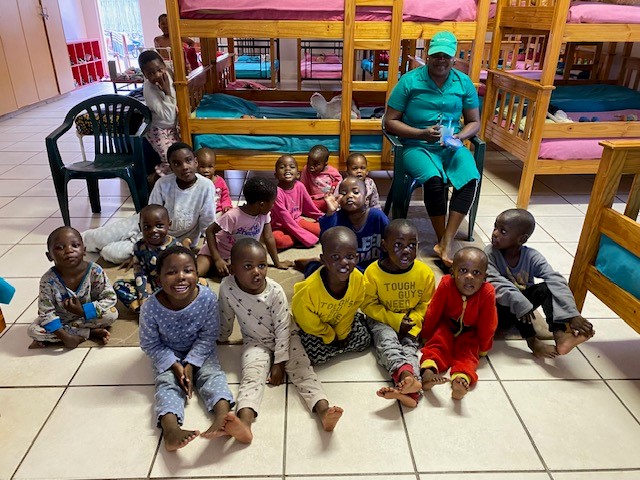
OLSH outreach in Brazil
The Daughters of Our Lady of the Sacred Heart are active in their ministry in several areas across Brazil, from educating young children to caring for the poor, the hungry, and the elderly. This year, they’re appealing for our help in funding a number of different projects that will continue to change lives for the better in regions of real and pressing need.
Sr Maria José Ferreira writes from Capanema, in the south of Brazil. The local community are currently working together to build a new chapel for the area, which is now almost complete. The community here need a sound system for their new chapel, to benefit their prayer and celebration. “We have celebrations there already, and we have a children’s choir also,” writes Sr Maria José. “It is a dynamic community. I believe this chapel will help many people to grow in faith.”
€2,000 will pay for a sound system in the new chapel, giving the community of Capanema
a place to gather in faith and love.
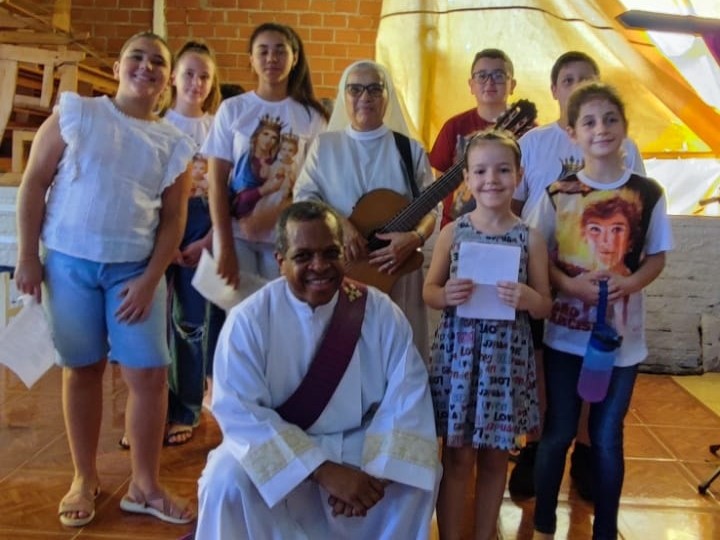
Sr Maria José is also raising funds to provide food parcels for very poor families in the local area of Capanema. “My apostolate is to visit families around the parish area,” she writes. “I have met many people, and I pray with them. It is so sad to see people living difficult financial times. Some do not have enough to eat. I would like to help them, and I am asking for money to buy them some food bags. I am aware this will not solve all the social problems that I see but it will give them a relief for some months.”
A total of €2,000 will help Sr Maria José to provide essential food parcels
for hungry families in the coming months.
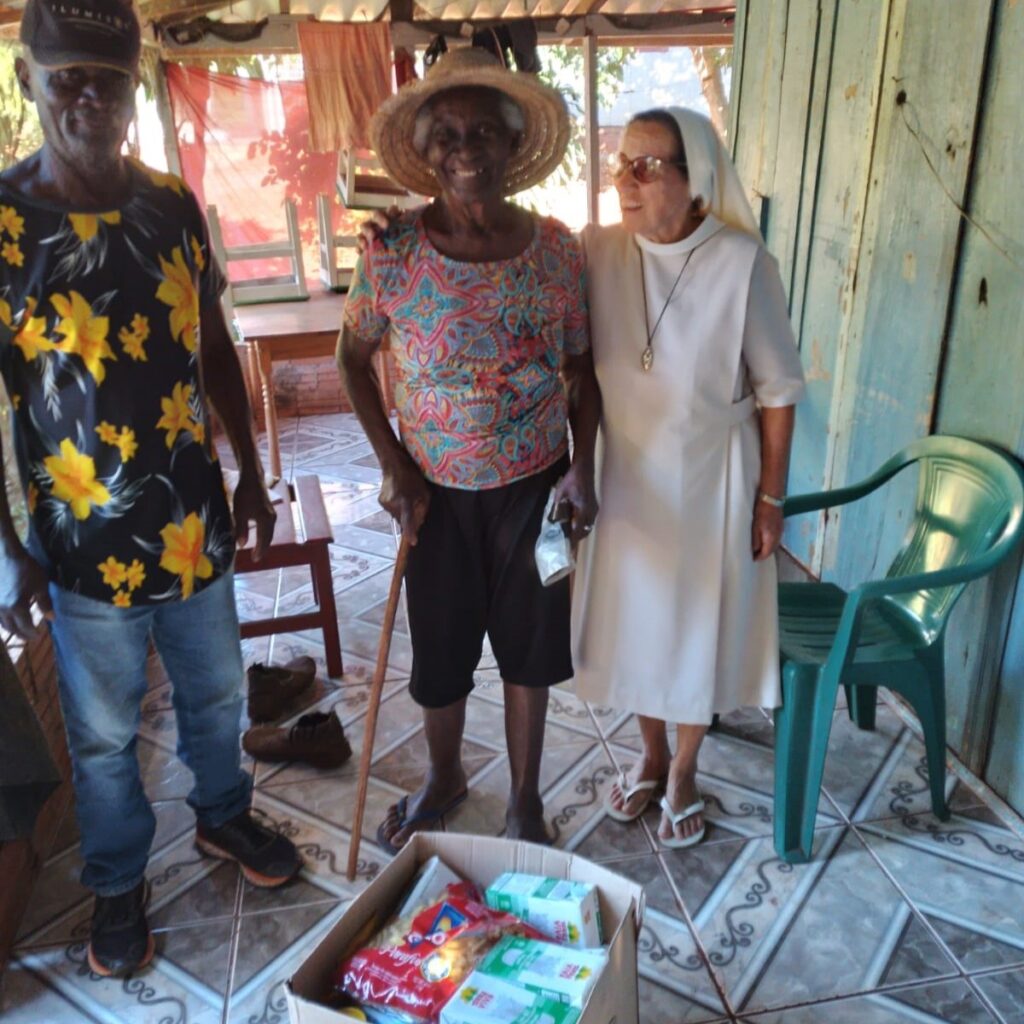
The Daughters of Our Lady of the Sacred Heart run a school in Rio de Janeiro, where the children get great enjoyment and benefit from their study and practise of musical skills. The school has a music classroom dedicated to these studies, and the Sisters here are working to raise funds to buy new instruments for the children and extend their current collection.
€2,000 will help OLSH Sisters in Rio de Janeiro to buy new musical instruments
for the children in their school, empowering and encouraging
them to learn new skills and foster creativity.
OLSH Sisters in Brazil also write of the importance of play in the development of the children in their care at their Rio de Janeiro school. “We believe children learn a lot when they are playing,” they write. “It is important to give them toys and objects that can help them to develop skills.” The Sisters have an area dedicated to play in their school, for children aged between 2 and 10 years of age, and they need to purchase new toys and educational games to assist in the children’s development.
€2,000 will buy a selection of educational toys and games
to help the children learn and grow through play.
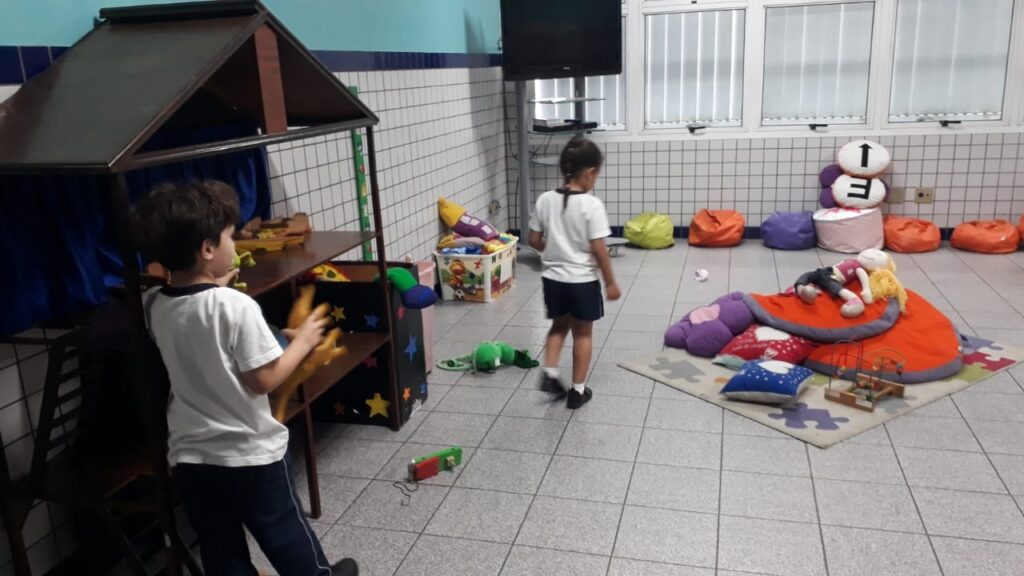
PLEASE SUPPORT OUR OLSH SISTERS IN THEIR GLOBAL OUTREACH
OLSH ministry across Africa
The Daughters of Our Lady of the Sacred Heart have been ministering across two dioceses in Burkina Faso for several years, and are now working to set up ministry in a third diocese, with enthusiastic and motivated young women requesting to join the Congregation. The OLSH Sisters involved in the formation programme for these young women are looking to transfer the Postulate from Zagtouli to Siogo, Tampoussimdi, which is a calm and peaceful place conducive to formation. The Sisters are now working to raise funds to build two new dormitories for the Postulate in a village not far from Ouagadougou, where there is plenty of space for the formation programme, and also scope for gardening and care of livestock in the surrounding fields.
A total of €10,000 will fund two new dormitories for these young women
working together in the love of Christ.
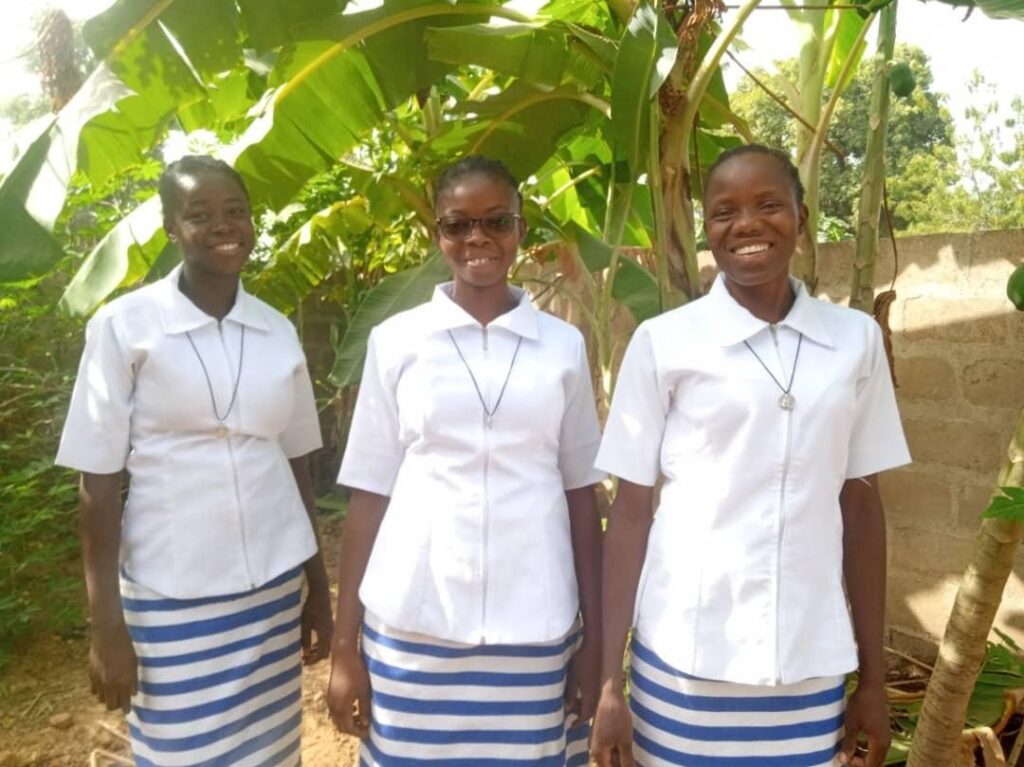
The Holy Family Care Centre is a residential care facility for children located in Ofcolaco, South Africa. Currently home to 75 abandoned and chronically ill children, Holy Family provides a loving, nurturing environment for children with critical medical needs, who have nowhere else to turn. The centre has a nursery which accommodates up to eight babies, plus four dormitories, two dedicated to older boys and girls, and two for boys and girls aged 2 to 10. The younger children, toddlers and preschoolers aged between 2 and 5 years, also sleep here, but are often overwhelmed by sharing the space with the older children in the group. The OLSH Sisters who take care of the crèche children feel that they would be better cared for if they had their own smaller space in a dedicated dormitory, which would reduce the noise and overstimulation at bedtime.
The Holy Family team need €20,000 to fund the toddlers’ area,
which will accommodate beds for up to 20 children and two staff members,
with space for winding down and quiet play.
The Jules Chevalier Health Centre was set up in December 2020 in the village of Maka Kahone in Senegal, working with the Ministry of Health to promote accessible healthcare for all, regardless of race, religion, or ethnicity. The centre offers a range of treatments to the people of Maka Kahone and surrounding villages, and its facilities are in great demand, as it is recognised for its high levels of care for patients. The health centre is now working to set up a laboratory with specific equipment, and staffed by trained personnel, in order to best manage the diagnoses of contagious diseases, maternity care, the care of young babies and children, predominant problems such as diabetes and high blood pressure, and further issues.
OLSH Sisters need €12,000 to purchase the necessary equipment for the new laboratory,
including a microscope, a centrifuge, micropipettes, a rotator, and other essential items.
The Jules Chevalier Health Centre in Mbandaka, Congo, has recently been extended, and is in need of new equipment to fill the new facility. Fundraising is underway to meet the centre’s current goals, including purchasing new medical equipment, reducing the maternal and infant mortality rate in Mdandaka and its surrounds, and improving the conditions of care for patients and the working conditions of staff at the centre.
The equipment required includes 10 beds, a consultation table, a medical stepladder,
10 bedside tables, a small surgery box, a delivery box, baby scales,
and other items, at a cost of €10,000.
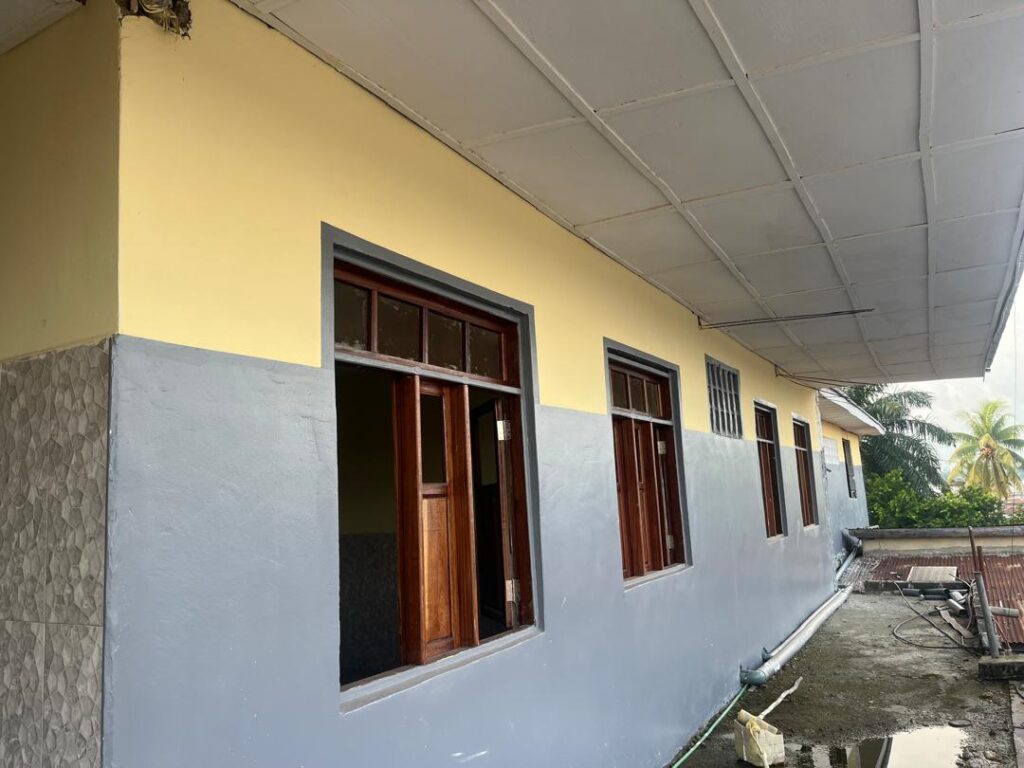
CAN YOU HELP OUR OLSH SISTERS IN AFRICA?
With ongoing mission projects in education, childcare, agriculture, and healthcare, OLSH ministry is touching and transforming lives across Africa.
“We are very grateful for all that you are and do for us. On behalf of the Daughters of Our Lady of the Sacred Heart, I thank all those who pay special attention to our projects.”
~ Sr Marie-Laure Lankoandé FNDSC, Regional Superior of Burkina Faso
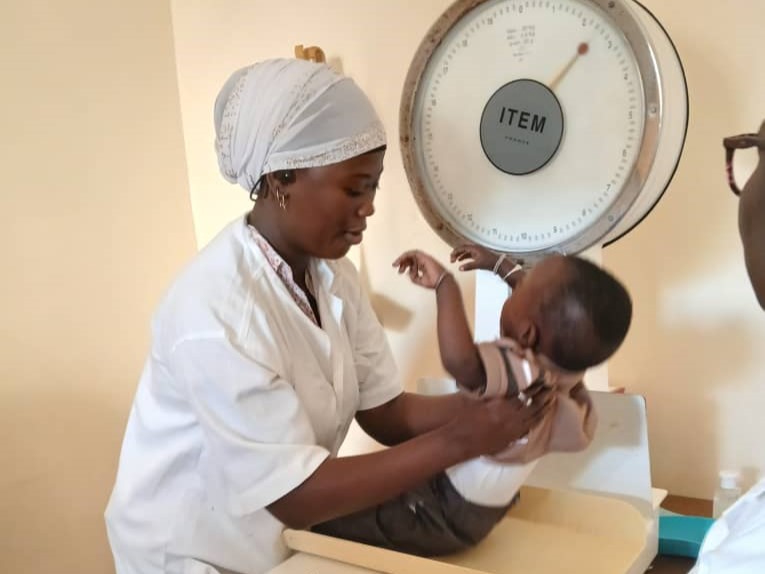
PLEASE SUPPORT OUR OLSH SISTERS IN THEIR GLOBAL OUTREACH
Feb 5, 2025
The Catholic Church in South Sudan is at the forefront of pastoral ministry in both education and health. Our impact is easily quantifiable by the number of students taught or patients treated. However, one of its most important roles is perhaps the most difficult to measure, peacebuilding. Grounded in the teaching of Jesus, it is the call of Christians everywhere to be peacemakers, fostering reconciliation and healing in our communities, giving witness by our lives to a different way that is grounded in justice and mercy.
This ministry in South Sudan is complex, to say the least. Following five decades of fighting for freedom from Sudan, 2011’s independence was a time of optimism for a wounded society. However, the ensuing civil war in 2013 saw over 400,000 people being killed, millions become displaced, and countless men, women, and children left traumatised. According to the UN, over a million people have fled here from war-torn Sudan since April of last year. It is, in many ways, the making of a perfect storm. But violence is like that, destructive, loud, and indiscriminate. How could you possibly respond to something so big that it is almost an act of God, although it is definitely not! Well, you could go for a walk.
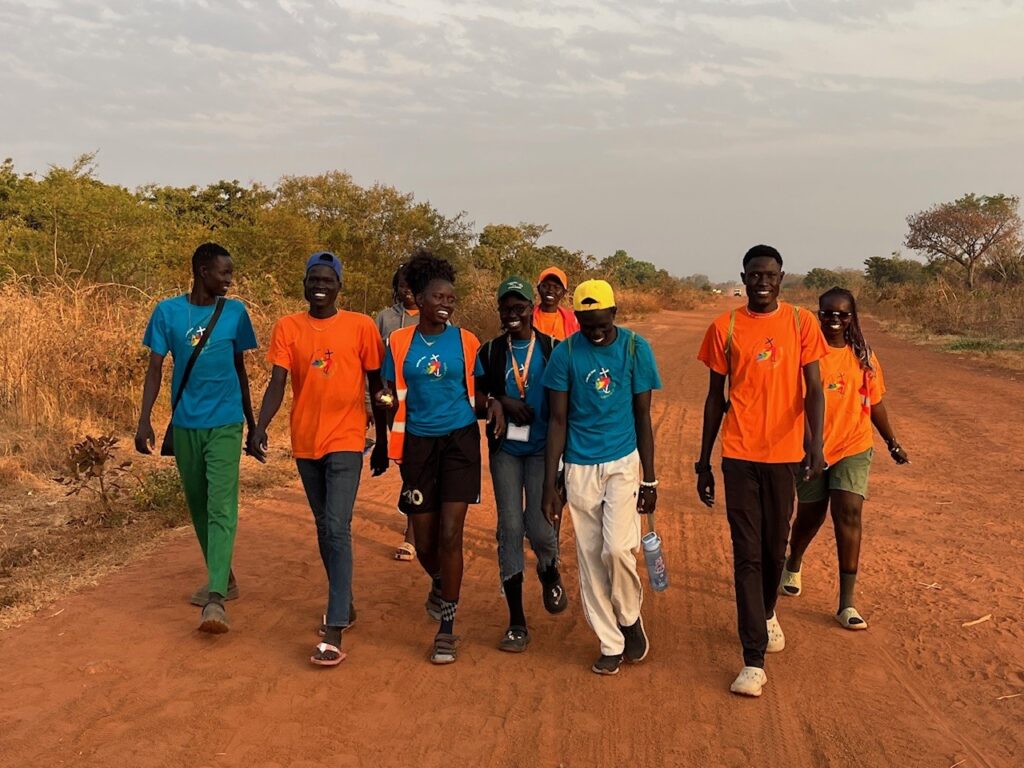
The Diocese of Rumbek Pilgrimage of Peace first started in February 2023. The idea came from Sr. Orla Treacy, a Loreto sister, who thought it would be a good idea for young people to walk from the centre of South Sudan to Juba to welcome Pope Francis during his first official visit to the country. Working with the youth team of the Diocese, it was an incredible success and captured the hearts of the people. The Pope even requested to meet the group personally when they arrived. Since, then it has continued to grow, with another pilgrimage in the west of the Diocese in 2024.
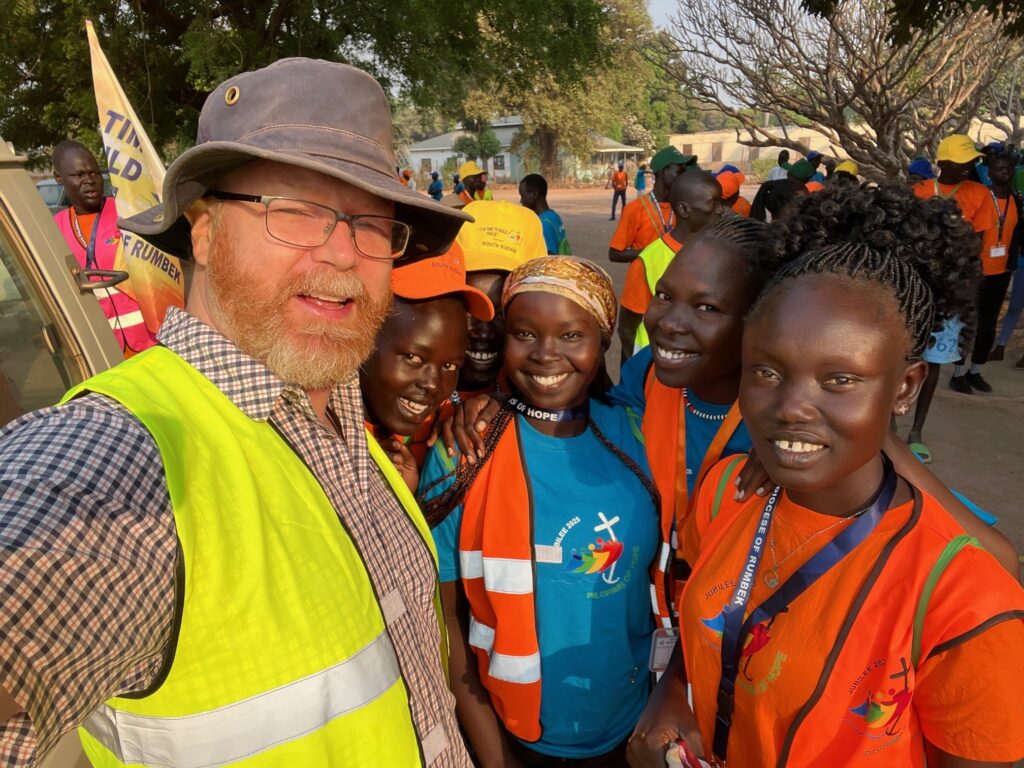
This year the pilgrimage was organised, not by the priests and religious of the Diocese, but by the youth themselves. Young men and women, veterans of last year’s pilgrimage, planned, organised, and implemented everything, from the beans we ate, to the route we took, to the places we slept. This gave us, as sisters, brothers, and priests, the opportunity to really journey with the youth, listening to their stories and sharing their hopes. On our first day we began with Mass in the Cathedral of Rumbek and were joined by the newly appointed Apostolic Nuncio to South Sudan, Archbishop Séamus Horgan (from Co. Clare), and our own Bishop Christian Carlassare.
Our route would take us through the south of Lakes State and into Western Equatoria, from Rumbek to Malou, Wulu, Mvolo, Mapourdit, and finally to Aluakluak, covering a distance of over 125km. We slept each night in the simple classrooms of local schools, although many of us opted to spend the night camped out under the stars. Possibly the one advantage to only 8% of the population of South Sudan having electricity at home is that the night skies are awesome in the truest sense of the word.
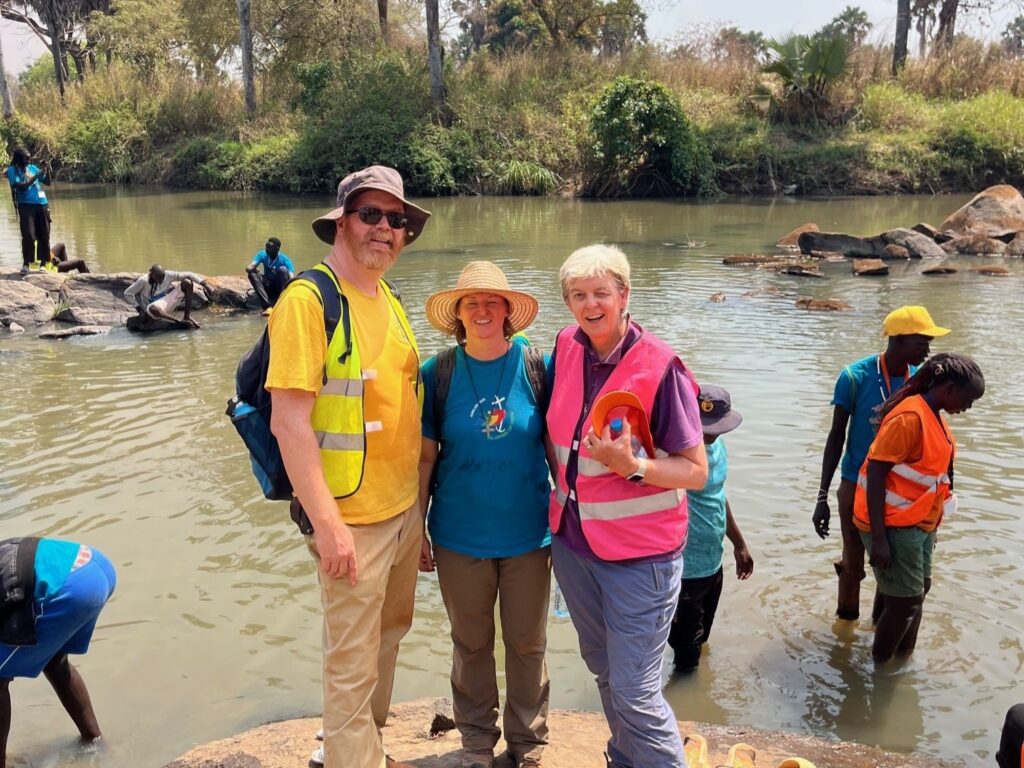
Each day we would rise at 5:30am, take a few minutes for warming up, and then hit the road. In the course of our pilgrimage, we would stop and speak with those we met along the way. Such a large and exuberant group caused a lot of comment. What were we doing? Why were we walking, when you could drive? How does a pilgrimage really help to promote peace?
The last question really touches into the heart of what we were trying to do. Not so long ago, many of the roads and paths we walked were impassable due to insecurity. Violence, theft and shootings were commonplace. To be able to walk now, without weapons, police, or security signalled loudly more than words could express that something different, something new was happening.
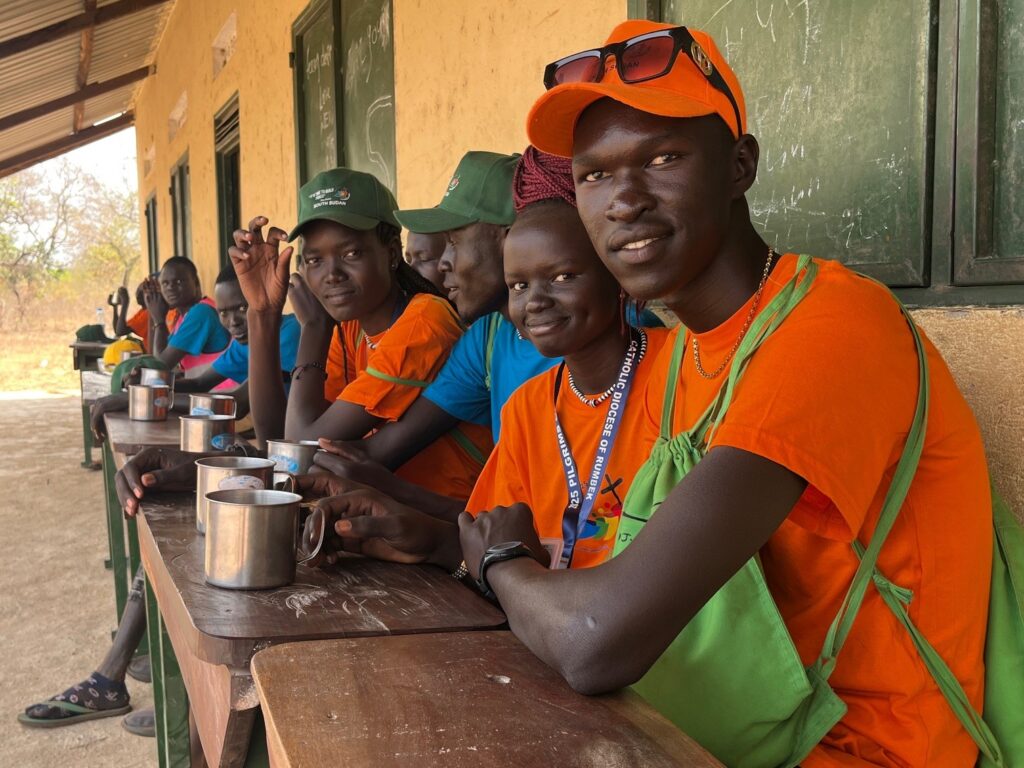
In addition, our group was made up of young people from around the Diocese, drawing from groups that have been traditionally hostile to one another. Their ability to walk together and work for peace re-enforced our message of hope. As the sun set, we were joined by the local people as we celebrated Mass and shared a simple meal of rice and beans together.
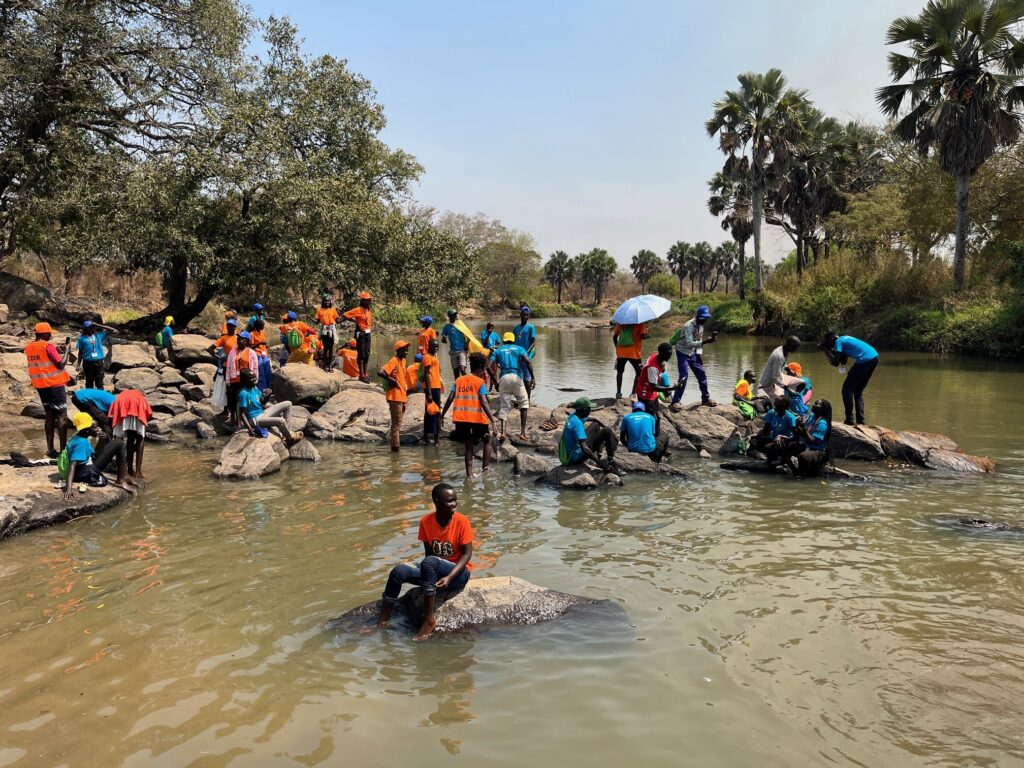
By the end of the week, we were blistered and, in my case, a little sunburnt, but happy. One of the group calculated that, between all of us, we had walked 27,000,000 million steps. New friendships had formed that would have been quite impossible before. We made our way home, with perhaps a renewed appreciation for running water and corrugated metal roofs. Above all, our time together and with the people we met was a quiet, but joyful witness of what could be, peace for a people weary of war and ready for a new beginning. It just takes a step.
Nhialic ke yin,
Fr. Alan
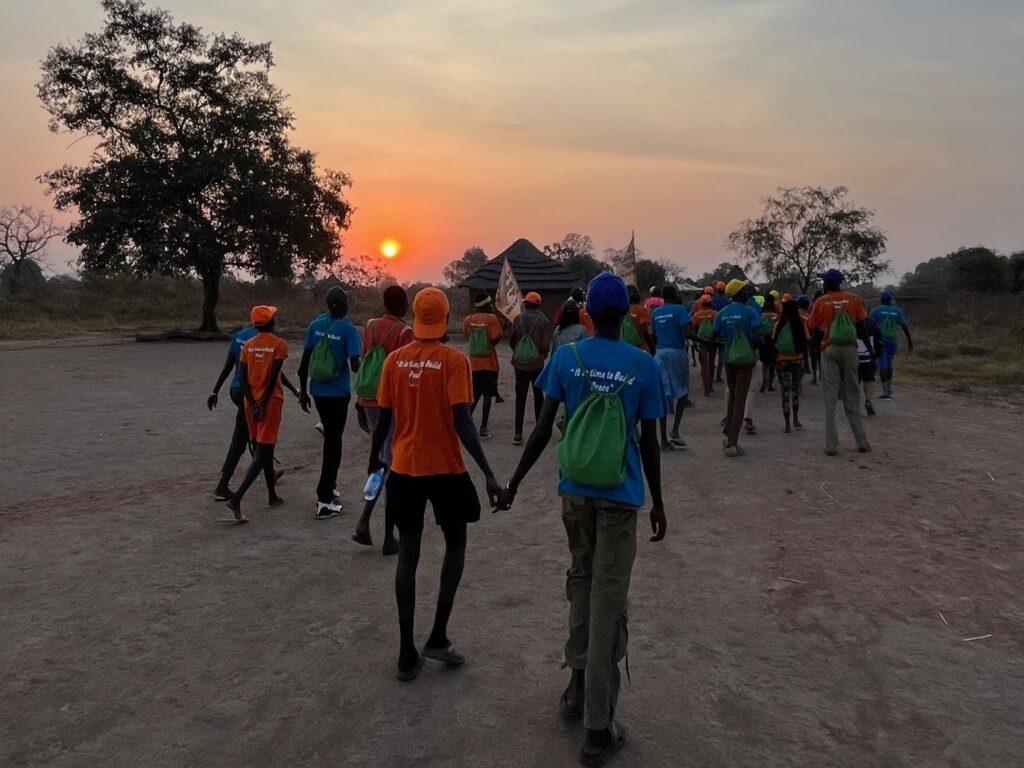
Read more from Fr Alan’s missionary journey in South Sudan:
Jan 16, 2025
What a wonderful way to begin the new year, with a very welcome update from our friends at the Holy Family Care Centre!
The Holy Family Care Centre is located in Ofcolaco, in the Limpopo Province of South Africa, where it provides residential care for up to 80 orphans, and sick and vulnerable children. Many of these children are living with chronic illnesses such as HIV/AIDs, TB, and other critical conditions. The children are mostly orphaned, and all are extremely vulnerable, so the Holy Family centre truly is a life-saving refuge for them. We at home in the Irish Province have long enjoyed an enduring friendship with Sr Sally and the Holy Family team, and our mission friends and extended Sacred Heart family here at home have provided invaluable support to the OLSH Sisters in Ofcolaco throughout the years.
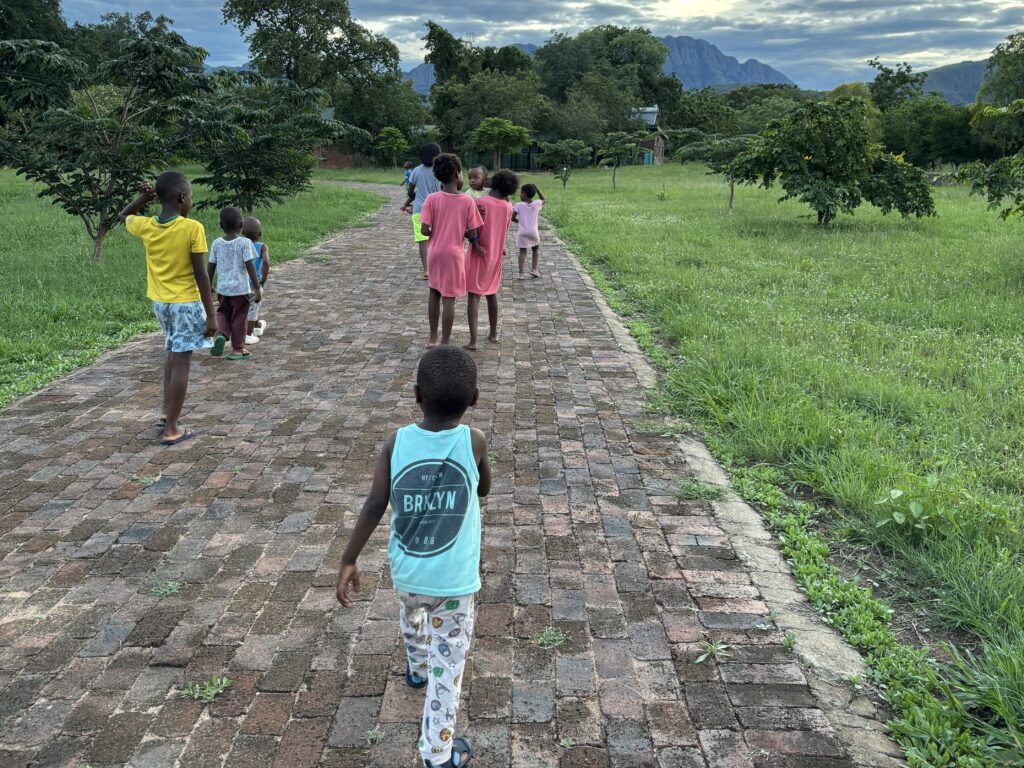
Back at the beginning of 2024, we asked our mission friends here at home to help the Holy Family community to raise funds to improve the dormitory facilities at the centre, and to build a new toilet block for the toddlers and younger children in their care.
Prior to this, the boys’ dormitory was home to 23 children and two staff members, with beds packed together side-by-side to fit everybody in. The Sisters were hoping to replace the 15-year-old bedding, and buy sets of bunk beds to create more space in the dormitory. Thanks to the generosity of our mission friends here in the Irish Province, the dormitory renovation has been a success, and the boys now have a far more comfortable space for rest.
The Sisters also wished to raise funds to build a toilet block for the 25 younger children in the crèche facility, with smaller, junior-sized toilets to help the toddlers with toilet training. The new toilet block has now been constructed, and is a great success with the younger members of the Holy Family community!
“Most sincere thanks to everyone who contributed to the 2024 World Projects Appeal,” writes Sr Jenny Christie FDNSC, International Development Officer for the Daughters of Our Lady of the Sacred Heart. “What a difference your support has made!”
We join Sr Jenny in thanking you, wholeheartedly, for your continued friendship and support, and we wish all at Holy Family a very happy, healthy, and peaceful 2025!
*
Dec 17, 2024
It’s all excitement in the Catholic University of South Sudan for the start of 2025. We are moving! Thanks in large part to the generous support of the Mission Support Office’s benefactors, we will shift all our lecturers and students to a local Catholic secondary school for the next four months. This will allow for the complete renovation of our existing halls, including lights and fans. We will be able to develop a programme of evening classes and extend our popular late night study sessions.
The building we are currently using is a repurposed youth centre, lacking ceilings, windows, and any electricity. As we move into the dry season, dust becomes a real problem and on a windy day it can feel like a scene out of Lawrence of Arabia minus the camels and sweeping vistas. During the rest of the year, when it rains it pours and students had to move to the centre of the classroom to avoid getting drenched.
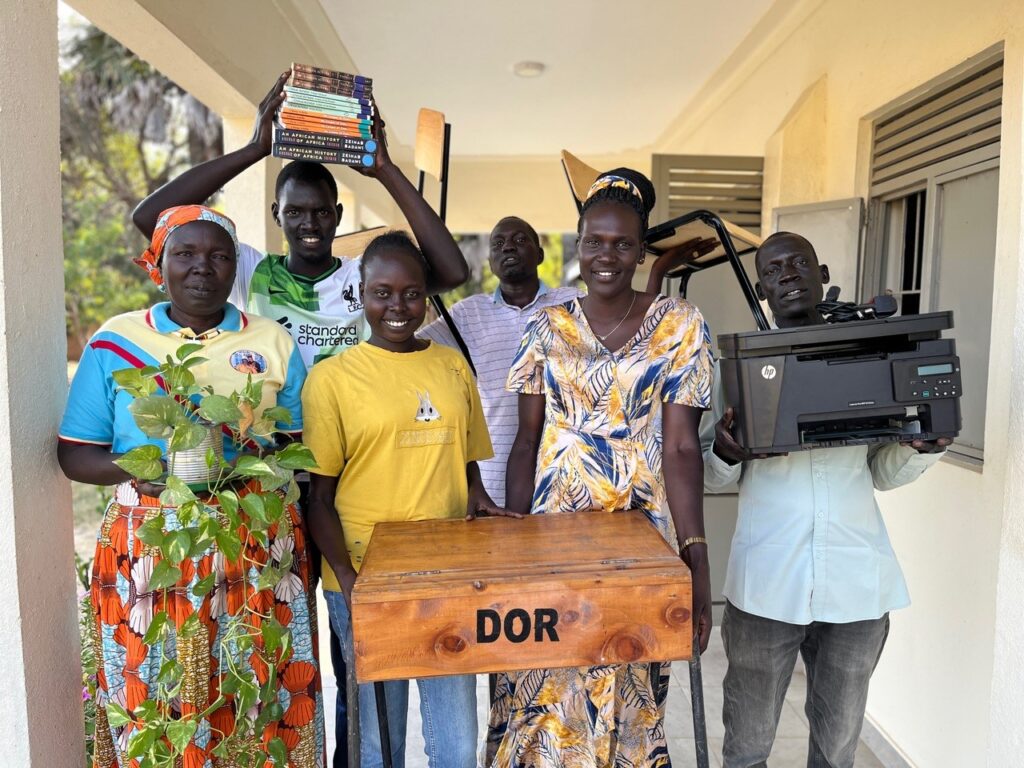
Many of our students actually came from that school, so it will be a chance to revisit the past and see if they can fit back into the small desks. It will take a considerable amount of effort, but it will be worth it. In future, we also want to use the new building as a training centre for existing teachers to upgrade their skills and support their work.
Thanks in a special way to all of you who have supported our ministry here and on behalf of everyone in the University we wish you a joyful Christmas and a peaceful New Year.
Nhialic abi thiei,
Fr. Alan
Our Students: Meet Helena and Isabella (Our newest student – just 2 months old)
Helena is 25 years old and is in her second year of a four-year Bachelor of Business Administration Degree. She has three other children along with Isabella. Only 4% of the population of South Sudan has access to electricity, so being able to study at night is a real challenge.
“I like to study in the Catholic University because there is availability of internet, to allow us to access new information. We have a little library and we have five computers. We now have night-time study twice a week and when my baby is old enough I can take part in it. During the day it is hot. Our temperatures can go up to 42C, so it is difficult to study. Our lecturers are very committed and we don’t miss a single class.
The University’s partial scholarship for women is encouraging us, as the full fee would be too much for us to pay, as many of us are not working. When you are pregnant in other universities you are suspended as a student, but here we are allowed to bring our babies with us and this is really helping us.
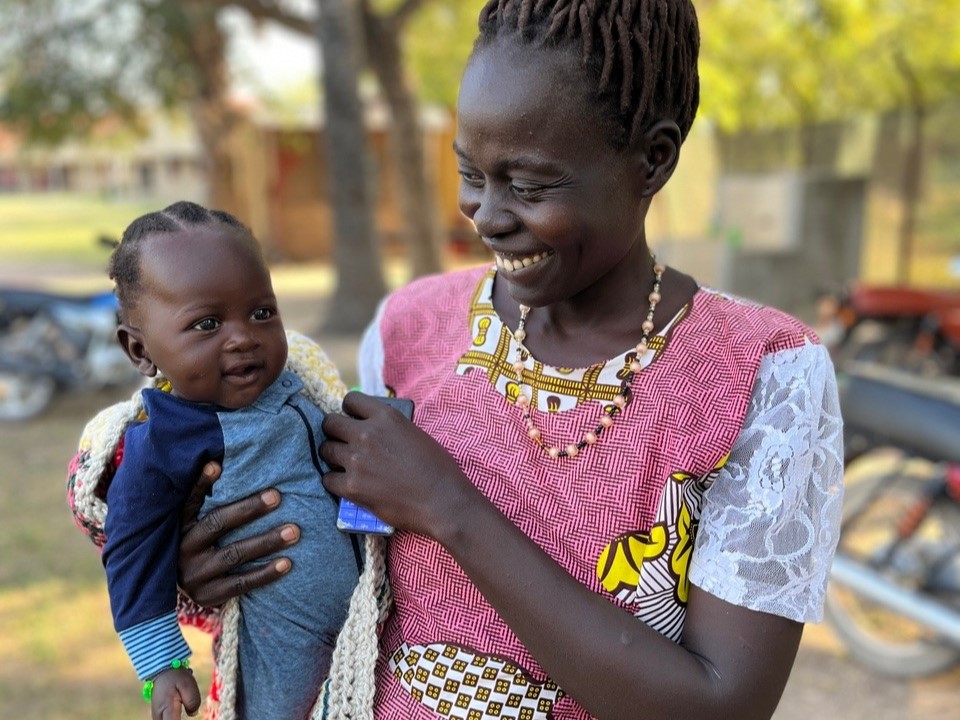
I study at night when the baby is asleep. When Isabella is awake she wants to know about everything I am doing. I have to get up at 2:00am and study until 4:00am using a torch. Then I start preparing for my other children to go to school, lighting the fire, and making the porridge.
My hope for the future is to open up my own school, to ensure that education reaches more children in South Sudan. In our primary schools we have a lot of students, up to 150 children in a class with one teacher and those teachers often are not well trained.
With everything that is going on here the number of students will increase next year. Our sisters are admiring how we going and they hope to join us.”
Read more from Fr Alan’s missionary journey in South Sudan:
Nov 28, 2024
November is a busy month in Rumbek. We are coming to the end of the year and students are preparing for their final exams. Before all that can happen, we had our graduation with our Senior 4 students. It is a time of sincere gratitude for all that has been achieved, for the sacrifices that were made, the work that was done. This year, 78 students graduated from Loreto, our largest number yet, and their families came from all over to celebrate their daughters’ success. It was day of speeches, prayer, and dancing.
No sooner had we tidied away the marquees and cleaned up the bunting, then it was down to the Primary School for our First Holy Communion Mass. Over the course of the year, these boys and girls attended special classes on Saturday mornings with Sr. Priyanka to prepare. They learned about the life of Jesus and his followers, the gift of the Eucharist given by God to all his people, and they practised their prayers in both Dinka and English. This First Holy Communion Day was a low-key affair by Irish standards, but was both joyful and heartfelt.
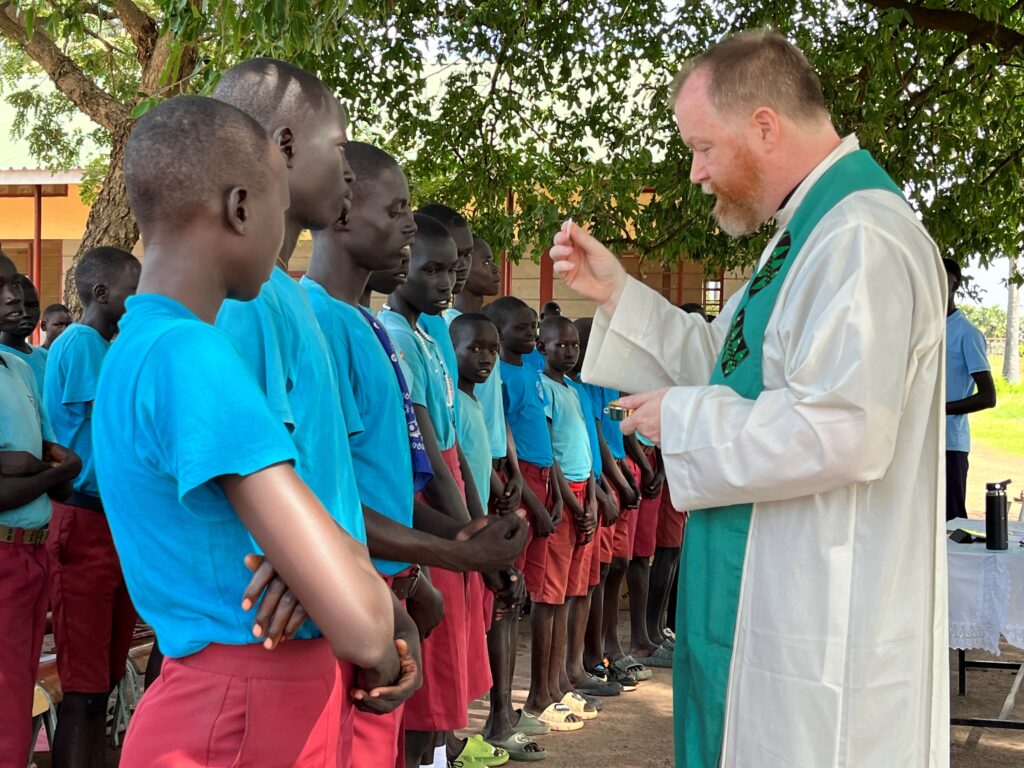
While the schools are winding down, the Catholic University is only getting started on our academic year. We are welcoming our largest cohort of students yet. It’s a real gift to have so many young women and men committed to further education and to raising up their country as future entrepreneurs and teachers. We now have well over a hundred students spread across three degree courses. In the midst of studies covering economics, African literature, and Catholic social ethics, there’s always time for fun, such as a friendly volleyball match between our old and new students. The lecturing staff also tried their luck and showed that our experience does not just begin and end at the lecture hall door. We still lost though – badly.
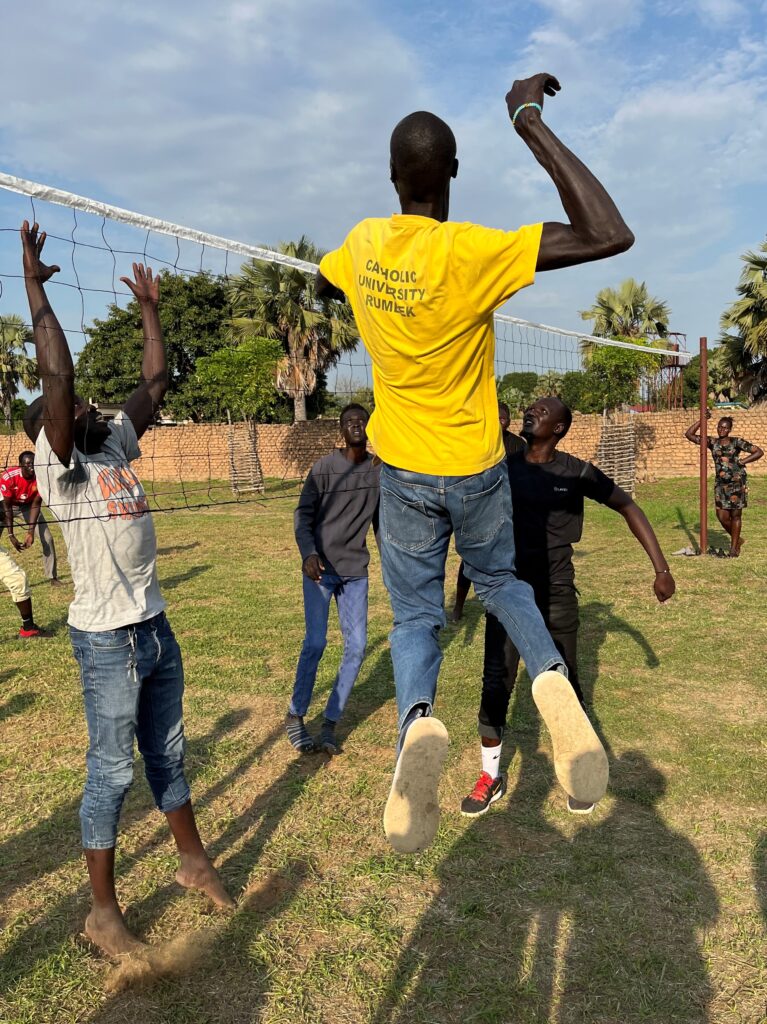
Only 4% of South Sudan has access to electricity, and this means that at nighttime there is little access to light in towns and almost nothing at all in the villages. To this end, we are starting our late-night study programme, opening our Catholic University library until 8:00pm two nights a week, with a view to expanding the programme. It will provide an essential opportunity to allow students to carry out course work, catch up on their reading, and progress their studies.
Over the weekend, we had our Secondary School Confirmations, with 44 Confirmandi. Since Bishop Christian has been appointed to the newly erected Diocese of Bentiu, I celebrated the sacrament with them. Over the past year, we have journeyed together as they explored their faith, grew in their relationship with God, and had ample time to ask as many challenging and insightful questions as possible, as teenagers are wont to do. It was also good to keep me on my theological toes.
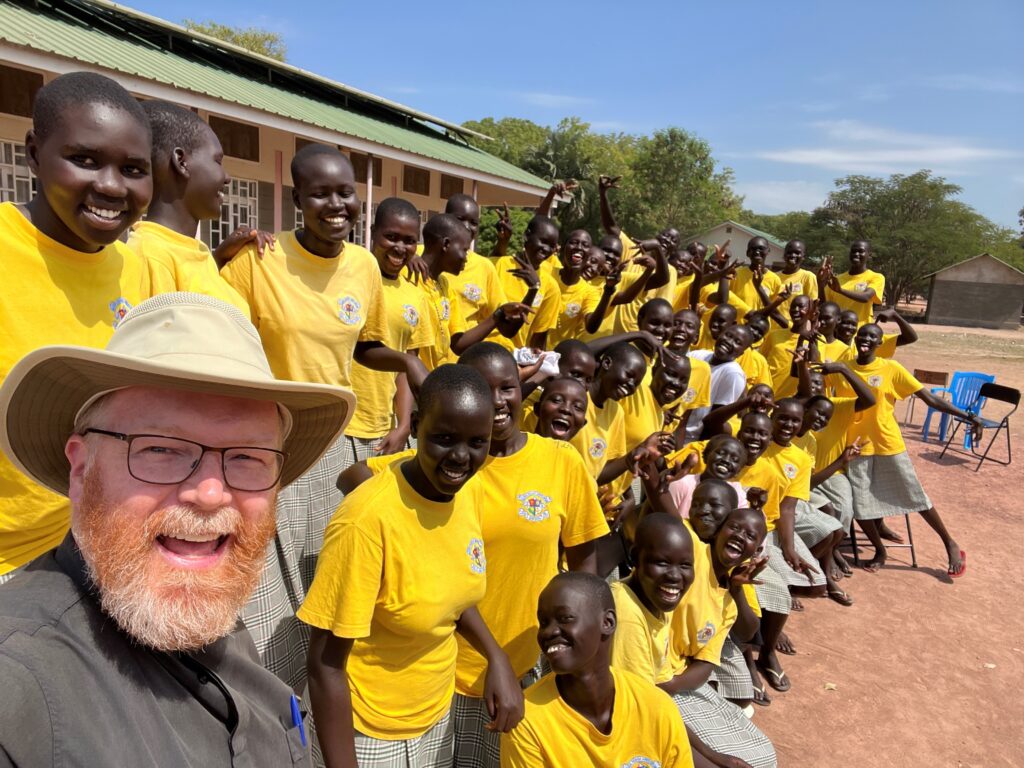
Looking forward to the next month, we have the Senior 4 exams (our equivalent of the Leaving Cert), a road trip to Juba to buy supplies for the year, and a seven-day Diocesan youth walking pilgrimage for peace through the bush, not to mention of course the celebration of Christmas. Life in Rumbek is many things, but never, ever boring.
Nhialic ke yin (God bless you),
Fr. Alan
Read more from Fr Alan’s missionary journey in South Sudan:






